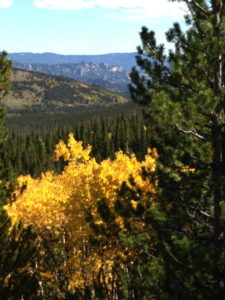
We each make our own path
—Patricia Maurice, May 2017
Several weeks ago, as I was listening to NPR on my car radio, I caught part of a debate on the meaning of Robert Frost’s much-loved poem, “The Road Not Taken.” Apparently, English majors have been debating for decades whether or not the traveler in the poem purposely took the path ‘less traveled by’ or, perhaps more correctly, whether the traveler could even tell which path was more or less traveled when deciding which way to proceed. It’s hard to know for sure when the poem, itself, is full of contradictions and as opaque as the yellow wood it describes.
I’ve encountered this poem many times over the years, as it has become an anthem for those of us who choose to live more or less offbeat, eccentric, unconventional lives. We wear our Road Less Traveled t-shirts as a badge of honor. And, why not? It’s part of the American way.
But, as someone who has lived much of her life mucking about on hiking trails, whether wooded or not, I don’t think choosing the way ‘less traveled’ is the main point of the poem. After all, the title of the poem is not “The Road Less Traveled” but rather “The Road Not Taken”—which is, to say, the road moretraveled in this particular poem. To me, the poem delves far more deeply into a basic philosophy of life—a philosophy I like to think of as ‘just forge ahead and enjoy yourself’. Or perhaps better stated… ‘don’t be afraid to embrace adventure’. Maybe even: ‘life, like poetry, shouldn’t be taken either too literally or too seriously’.
Consider yourself the traveler in the poem, perhaps a hiker making your way along a wooded path. Suddenly, you come to a fork in the road. There is no trail sign—no way to tell which of the two similar looking paths is the main route or which is the ‘right’ path to take. I’ve been in this situation many more times than I can count, and it’s part of the fun. Taking an unmarked path has led to some memorable adventures: seeing a waterfall I never knew existed or climbing a mountain peak or meeting an interesting fellow traveler who became a life-long friend. Other times—like when it’s starting to hail small boulders or I’m already running late for meeting my spouse at a pre-designated location— an unmarked fork can be reason for minor panic.
Note, though, the traveler in the poem doesn’t do what many a hiker, including yours truly, has done in countless such situations. He doesn’t mutter a curse about how poorly maintained the trail system is and resolve to write a letter of complaint that the route isn’t properly signed. He doesn’t pull out his handy-dandy GPS—all right, they didn’t have GPSs in Robert Frost’s days, but they certainly had compasses and maps—and diligently figure out which path to take. He doesn’t pull out his lunch, park his butt on a rock, and wait for someone to mosey down one of the paths and explain where it leads. He doesn’t turn back to the comfort of the well known path he just came from. Instead, he peers ahead a bit, shrugs his shoulders, opts for the path that looks a little greener and perhaps a little less heavily trodden, and then forges ahead. And, apparently, once he realizes he’s not on a heavily trodden, smooth, easy, popular route, he doesn’t turn around but rather embraces the joys and challenges of a road less traveled.
That attitude — ‘let’s explore this interesting looking path and enjoy wherever it takes us in life’ — is, to my mind, the main message of the poem. Let’s face it, no matter how well mapped out or heavily trodden or popular a given path may be, we never really know where it will take us. There are no clear signposts in life. When we come to an uncertain fork, we can panic, we can pull out all our maps and tools and try to intellect our way through, we can wait for someone else to come along and give us directions, we can turn back and run for the safety of the known… or, like the intrepid traveler in Robert Frost’s poem, we can forge ahead with a spirit of adventure. If we’re true to ourselves and perhaps a little bit lucky, we might just stumble upon a road less traveled. In any case, we should embrace it as the road we chose, whether deliberately or not.
By embracing life and treating it like the adventure it is, we will indeed have made all the difference—not just to ourselves but to everyone we know and love. Perhaps with that attitude, we can’t help but choose ‘the path less traveled by’ because it’s our own individual path.
And oh, what a great adventure it will be.